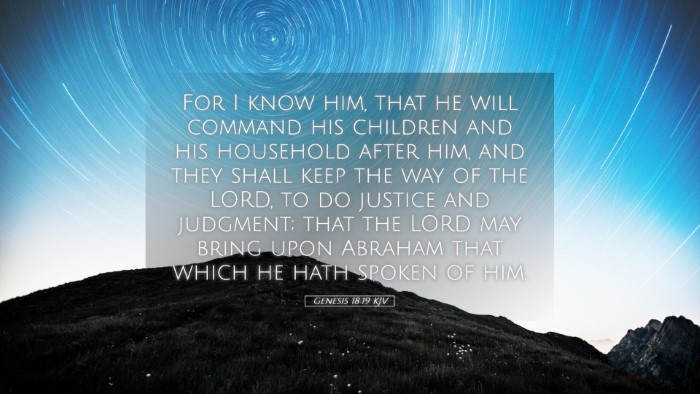Commentary on Genesis 18:19
Genesis 18:19 states: "For I have chosen him, that he may command his children and his household after him to keep the way of the Lord by doing righteousness and justice, so that the Lord may bring to Abraham what he has promised him."
Introduction
This verse presents a pivotal moment in the narrative of Abraham, highlighting his role in divine plans and the expectations placed upon him as a patriarch. In this commentary, we will explore various insights on the significance of Abraham's selection, the implications for his household, and the broader theological themes that arise from this passage.
Divine Choice
Matthew Henry points out that God’s choosing of Abraham is not arbitrary but intentional, rooted in divine purpose. This selection conveys God's desire to establish a covenantal relationship with Abraham and his descendants:
- Purpose of Selection: Henry emphasizes that God chose Abraham for a specific reason—he is to lead his household in the ways of the Lord.
- Implication of Leadership: Abraham's leadership reflects not just a responsibility but a calling that has lasting implications for generations.
Commanding His Household
Albert Barnes elaborates on the concept of Abraham commanding his household, stressing the significance of family leadership in spiritual matters:
- Role of Fathers: Barnes highlights that fathers are given the duty to instruct and guide their children in righteousness, which is a theme prevalent throughout Scripture.
- Spiritual Legacy: The notion that Abraham must command his household after him underscores the importance of passing down spiritual teachings and values.
The Way of the Lord
Adam Clarke provides an in-depth analysis of what it means to keep the way of the Lord:
- Righteousness and Justice: Clarke stresses that the path of the Lord is characterized by righteousness and justice—key attributes that should define the conduct of Abraham's family.
- Practical Obedience: Keeping the way of the Lord is not merely cognitive acknowledgment but involves active participation in fulfilling God's commands.
Covenantal Promise
Continuing with the covenants, Henry notes the link between Abraham’s obedient leadership and the fulfillment of God’s promises:
- Divine Promises: The verse indicates a conditional element—that God's promises to Abraham are connected to Abraham’s faithfulness and the faithfulness of his household.
- Future Generations: This connection paints a picture where the obedience of one generation impacts the blessings of the next, establishing a model for covenantal faith.
Application for Today
The insights gleaned from Genesis 18:19 offer valuable lessons for modern believers:
- Leadership in Faith: Pastors and spiritual leaders today must recognize their role in educating and guiding their communities in righteousness.
- Family Dynamics: Families are called to live out their faith actively, ensuring that the ways of the Lord are maintained throughout generations.
- Commitment to Justice: The call to righteousness and justice remains pertinent today, encouraging believers to uphold these values in societal contexts.
Conclusion
In summary, Genesis 18:19 reveals profound truths about God's choice of Abraham, the responsibilities tied to that choice, and the expectations for spiritual leadership within families. The integration of righteousness and justice within the life of the believer and their household serves as a timeless reminder of the covenantal relationship that comes with divine promise.


